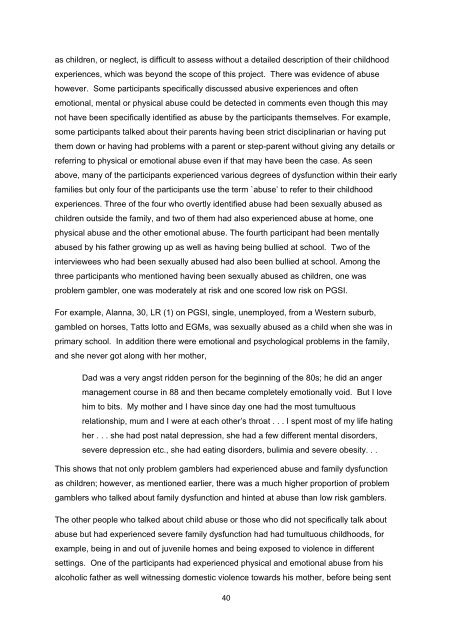Gamblers tell their stories: Life patterns of gambling
Gamblers tell their stories: Life patterns of gambling
Gamblers tell their stories: Life patterns of gambling
Create successful ePaper yourself
Turn your PDF publications into a flip-book with our unique Google optimized e-Paper software.
as children, or neglect, is difficult to assess without a detailed description <strong>of</strong> <strong>their</strong> childhood<br />
experiences, which was beyond the scope <strong>of</strong> this project. There was evidence <strong>of</strong> abuse<br />
however. Some participants specifically discussed abusive experiences and <strong>of</strong>ten<br />
emotional, mental or physical abuse could be detected in comments even though this may<br />
not have been specifically identified as abuse by the participants themselves. For example,<br />
some participants talked about <strong>their</strong> parents having been strict disciplinarian or having put<br />
them down or having had problems with a parent or step-parent without giving any details or<br />
referring to physical or emotional abuse even if that may have been the case. As seen<br />
above, many <strong>of</strong> the participants experienced various degrees <strong>of</strong> dysfunction within <strong>their</strong> early<br />
families but only four <strong>of</strong> the participants use the term `abuse’ to refer to <strong>their</strong> childhood<br />
experiences. Three <strong>of</strong> the four who overtly identified abuse had been sexually abused as<br />
children outside the family, and two <strong>of</strong> them had also experienced abuse at home, one<br />
physical abuse and the other emotional abuse. The fourth participant had been mentally<br />
abused by his father growing up as well as having being bullied at school. Two <strong>of</strong> the<br />
interviewees who had been sexually abused had also been bullied at school. Among the<br />
three participants who mentioned having been sexually abused as children, one was<br />
problem gambler, one was moderately at risk and one scored low risk on PGSI.<br />
For example, Alanna, 30, LR (1) on PGSI, single, unemployed, from a Western suburb,<br />
gambled on horses, Tatts lotto and EGMs, was sexually abused as a child when she was in<br />
primary school. In addition there were emotional and psychological problems in the family,<br />
and she never got along with her mother,<br />
Dad was a very angst ridden person for the beginning <strong>of</strong> the 80s; he did an anger<br />
management course in 88 and then became completely emotionally void. But I love<br />
him to bits. My mother and I have since day one had the most tumultuous<br />
relationship, mum and I were at each other’s throat . . . I spent most <strong>of</strong> my life hating<br />
her . . . she had post natal depression, she had a few different mental disorders,<br />
severe depression etc., she had eating disorders, bulimia and severe obesity. . .<br />
This shows that not only problem gamblers had experienced abuse and family dysfunction<br />
as children; however, as mentioned earlier, there was a much higher proportion <strong>of</strong> problem<br />
gamblers who talked about family dysfunction and hinted at abuse than low risk gamblers.<br />
The other people who talked about child abuse or those who did not specifically talk about<br />
abuse but had experienced severe family dysfunction had had tumultuous childhoods, for<br />
example, being in and out <strong>of</strong> juvenile homes and being exposed to violence in different<br />
settings. One <strong>of</strong> the participants had experienced physical and emotional abuse from his<br />
alcoholic father as well witnessing domestic violence towards his mother, before being sent<br />
40


